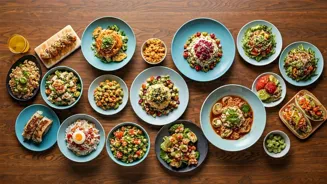Cultural Fusion's Rise
The global food scene is currently experiencing a powerful wave of cultural fusion, where culinary traditions from different regions are blending seamlessly.
This trend highlights a growing openness to experimentation and cross-cultural exchange in the kitchen. Chefs are skillfully merging flavors, ingredients, and cooking methods from various parts of the world, resulting in dishes that are both innovative and familiar. This fusion isn't just about combining ingredients; it's about creating new culinary experiences that reflect a deeper understanding and appreciation of different cultures. The trend is visible in the use of spices from the Middle East, South America's vibrant fruit in desserts, or the adoption of fermentation techniques from Asia, all creating a rich tapestry of flavors, and it's a testament to our increasingly interconnected world.
Tech's Kitchen Revolution
Technology is significantly reshaping the culinary landscape, from how food is produced to how it is prepared and consumed. Smart kitchen appliances, for instance, are becoming increasingly sophisticated, enabling home cooks to automate tasks like cooking and meal planning. Furthermore, digital platforms are revolutionizing food delivery services, making it easier than ever to access diverse culinary options from anywhere. The Internet of Things (IoT) allows appliances to communicate and be controlled remotely, enhancing convenience and precision in the kitchen. AI-powered recipe recommendations and virtual cooking assistants are guiding users through the cooking process, helping them explore new flavors and techniques. Food manufacturers are also leveraging technology to enhance efficiency and improve food safety, impacting the entire supply chain.
Plant-Based's Growing Popularity
Plant-based diets continue to gain momentum as a significant trend, driven by growing consumer awareness of health, environmental sustainability, and animal welfare. The plant-based movement is not just about vegetarianism or veganism; it's about embracing innovative ways to enjoy plant-derived ingredients in creative and delicious dishes. This trend has spurred significant advancements in food technology, resulting in the development of plant-based meat alternatives, dairy-free products, and a wide variety of vegan options. These products are designed to replicate the taste, texture, and appearance of traditional animal-based foods, making it easier than ever for consumers to integrate plant-based meals into their diets. Restaurants and food manufacturers are increasingly responding to this demand, offering a diverse range of plant-based options to cater to this expanding market.
Sustainability's Key Role
Sustainability has become a central theme in the food industry, reflecting a widespread concern for environmental responsibility and the ethical sourcing of ingredients. Consumers are actively seeking out food products that are produced in a way that minimizes environmental impact, such as organic farming, reducing carbon footprints, and supporting local producers. Sustainable practices are implemented across the food supply chain, from farm to table, including eco-friendly packaging, reducing food waste, and promoting biodiversity. Sustainable food choices are more than a trend, representing a shift towards conscious consumption. Initiatives to promote food security and reduce hunger are gaining ground, making it a cornerstone of modern culinary practices.
Global Culinary Destinations
The rise of culinary tourism is inspiring travel and adventure in a quest for diverse and authentic food experiences, offering travelers the opportunity to explore different cultures through their cuisine. Cities worldwide are emerging as hotspots for foodies, each offering unique gastronomic adventures. From the bustling street food markets of Southeast Asia to the Michelin-starred restaurants of Europe, food travelers are increasingly seeking out immersive culinary experiences. Many travelers plan their itineraries around food-related events, such as food festivals, cooking classes, and farm-to-table dinners, to deepen their understanding of different cultures. Food destinations provide a window into a region's history, traditions, and values, making it a powerful driver of cultural exchange and understanding.













